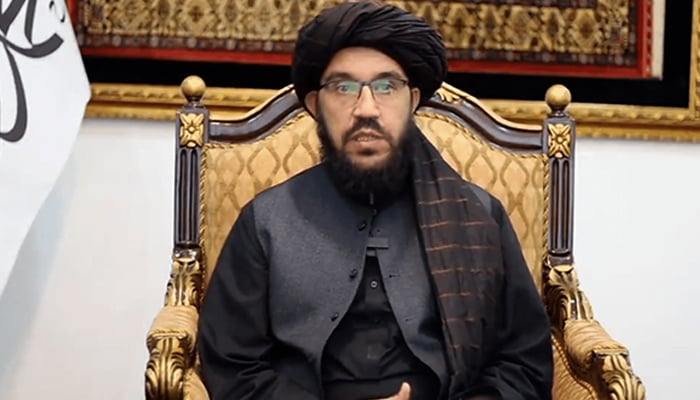
- CPEC created many opportunities for region: diplomat.
- Says Kabul’s involvement in BRI bring regional countries closer.
- Shakeeb addresses seminar at Institute of Regional Studies.
ISLAMABAD: Responding to Islamabad’s complaints to Kabul on security issues, Afghan Chargé d’Affaires Mawlawi Sardar Ahmad Shakeeb said on Tuesday Afghanistan will not allow its soil to be used by terrorist groups against Pakistan.
He was speaking at a seminar titled “Strengthening Economic Ties between Pakistan, Afghanistan, and Central Asia” organised by the Institute of Regional Studies (IRS).
Pakistan has witnessed a surge in militant attacks since the Taliban government returned to power in neighbouring Afghanistan in 2021, mostly in the northwestern border province of Khyber Pakhtunkhwa, but also in southwestern Balochistan, which abuts Afghanistan and Iran.
Islamabad accuses Kabul’s interim rulers of failing to root out militants sheltering on Afghan soil as they prepare to stage assaults on Pakistan.
“Both Pakistan and Afghanistan are facing security challenges and peace, security and stability in the region is our wish,” said the Afghan diplomat.
Speaking about the Pakistan government’s security concerns in relation to Afghanistan, Shakeeb said Kabul was trying to persuade Islamabad that “some non-state elements are behind infiltration inside Pakistan”.
Shakeeb stressed that Afghanistan’s policy is clear that it does not support non-state elements.
Speaking about the China-Pakistan Economic Corridor (CPEC), Shakeeb said that the project created many opportunities for the region which could benefit Afghanistan as well.
He also said that Afghanistan’s involvement in the Belt and Road Initiative would not only enhance investments in its infrastructure but also bring the regional countries closer.
“We believe that trilateral cooperation among Afghanistan, Pakistan, and China can usher in a new era of regional collaboration.”
Terming Pakistan as one of the leading trade partners of Afghanistan, he expressed the Afghan interim administration’s commitment to the enhancement of trade and investment between the two countries.
He acknowledged the recent challenges in trade and economic relations between the two countries but felt that Afghanistan was striving to revitalise the economic relations.
Besides the security-related issues, the Taliban diplomat highlighted the Western sanctions, frequent closures of crossing points, limited customs facilitation, sudden and unilateral increases in tariffs, and frequent checking of loaded vehicles as major obstacles to trade flows.
He underlined the need for the two countries to invest in trade infrastructure, streamline customs processes, strengthen trade facilities, develop transportation links, build mutual trust, and enhance diplomatic dialogues to achieve long-term trade benefits.
While calling for greater collaboration on economic policies and expansion of transportation and transit projects between Pakistan and Afghanistan, he emphasised the desirability of sustained diplomatic engagement among the regional countries and joint efforts for peace and security to provide a sustainable foundation for regional economic cooperation.
Shakeeb also underpinned the need to refrain from imposing economic restrictions and other policies that hinder regional economic cooperation.
The Afghan Chargé d’Affaires highlighted the importance of Afghanistan as a bridge between South and Central Asia.
He shared that the Afghan interim administration had already started work on the Turkmenistan-Afghanistan-Pakistan-India (Tapi) gas pipeline and added that Kazakhstan had expressed interest in joining the project.
Shakeeb further shared Afghanistan was working towards implementing projects such as the Trans-Afghan Railway, CASA-1000, and other regional initiatives.
Speaking on the occasion, IRS President Ambassador Jauhar Saleem underscored the importance of peace and stability in Afghanistan for intraregional trade and economic prosperity.
He felt that any insecurity in Afghanistan and inability to prevent the outflow of terrorism would not allow the building of regional economic cooperation that could help bring prosperity to the people of the entire neighbourhood.



